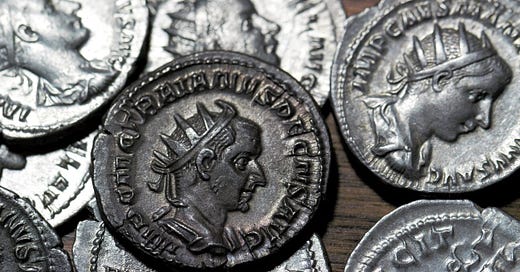In today’s readings, Tobit is starting to wonder when (or if) he’ll be rewarded for his good deeds. Jesus, meanwhile, wants us to pay tribute to God or Caesar, but not both.
Reading 1
Tb 2:9-14
On the night of Pentecost, after I had buried the dead, I, Tobit, went into my courtyard to sleep next to the courtyard wall. My face was uncovered because of the heat. I did not know there were birds perched on the wall above me, till their warm droppings settled in my eyes, causing cataracts. I went to see some doctors for a cure but the more they anointed my eyes with various salves, the worse the cataracts became, until I could see no more. For four years I was deprived of eyesight, and all my kinsmen were grieved at my condition. Ahiqar, however, took care of me for two years, until he left for Elymais.
At that time, my wife Anna worked for hire at weaving cloth, the kind of work women do. When she sent back the goods to their owners, they would pay her. Late in winter on the seventh of Dystrus, she finished the cloth and sent it back to the owners. They paid her the full salary and also gave her a young goat for the table. On entering my house the goat began to bleat.
I called to my wife and said: "Where did this goat come from? Perhaps it was stolen! Give it back to its owners; we have no right to eat stolen food!" She said to me, "It was given to me as a bonus over and above my wages." Yet I would not believe her, and told her to give it back to its owners. I became very angry with her over this. So she retorted: "Where are your charitable deeds now? Where are your virtuous acts? See! Your true character is finally showing itself!"
As a direct result of burying the dead, Tobit is blinded. His good deeds aren’t immediately rewarded, as you might expect.
Obviously, this eats away at him, since he snaps at his wife when something good finally does happen. And that’s where his wife has a point—he’s charitable to strangers, but not his own wife?
So, was he actually trying to be a good person with all those virtuous acts? Or was he doing it all for show? It’s something worth reflecting on for all of us.
Responsorial Psalm
Ps 112:1-2, 7-8, 9
R. The heart of the just one is firm, trusting in the Lord.
Blessed the man who fears the LORD,
who greatly delights in his commands.
His posterity shall be mighty upon the earth;
the upright generation shall be blessed.
R. The heart of the just one is firm, trusting in the Lord.
An evil report he shall not fear;
his heart is firm, trusting in the LORD.
His heart is steadfast; he shall not fear
till he looks down upon his foes.
R. The heart of the just one is firm, trusting in the Lord.
Lavishly he gives to the poor;
his generosity shall endure forever;
his horn shall be exalted in glory.
R. The heart of the just one is firm, trusting in the Lord.
This would be a hard one for Tobit to read. He’s been doing the right thing, yet he hasn’t seen positive results. Will he remain firm? Does he fear?
One thing for us to remember is that our story is not over yet. We might be at the low point, or it may get worse still. But either way, it’s not over.
Alleluia
See Eph 1:17-18
R. Alleluia, alleluia.
May the Father of our Lord Jesus Christ
enlighten the eyes of our hearts,
that we may know what is the hope
that belongs to his call.
R. Alleluia, alleluia.
Hope is not only the desire for something, but the expectation of obtaining it. We don’t know when or how God the Father will call us home, but we hope he will.
Gospel
Mk 12:13-17
Some Pharisees and Herodians were sent to Jesus to ensnare him in his speech. They came and said to him, "Teacher, we know that you are a truthful man and that you are not concerned with anyone's opinion. You do not regard a person's status but teach the way of God in accordance with the truth. Is it lawful to pay the census tax to Caesar or not? Should we pay or should we not pay?"
Knowing their hypocrisy he said to them, "Why are you testing me? Bring me a denarius to look at."
They brought one to him and he said to them, "Whose image and inscription is this?"
They replied to him, "Caesar's."
So Jesus said to them, "Repay to Caesar what belongs to Caesar and to God what belongs to God." They were utterly amazed at him.
The Pharisees think they’ve trapped Jesus in a corner. He’s claimed authority as a rabbi, and so He can’t just avoid the question. And in that setting, He can’t offer a “pragmatic” solution; it has to fit within the Jewish law.
Jesus once again answers a question with a question, which highlights the fact that the claims of God and Caesar are mutually exclusive. If one's faith is in God, then God is owed everything; Caesar's claims are necessarily illegitimate, and he is therefore owed nothing. If, on the other hand, one's faith is in Caesar, God's claims are illegitimate, and Caesar is owed, at the very least, the coin which bears his image.
So now, Jesus isn’t the one backed into a corner, the Pharisees are. They have to choose sides: God or Caesar?



